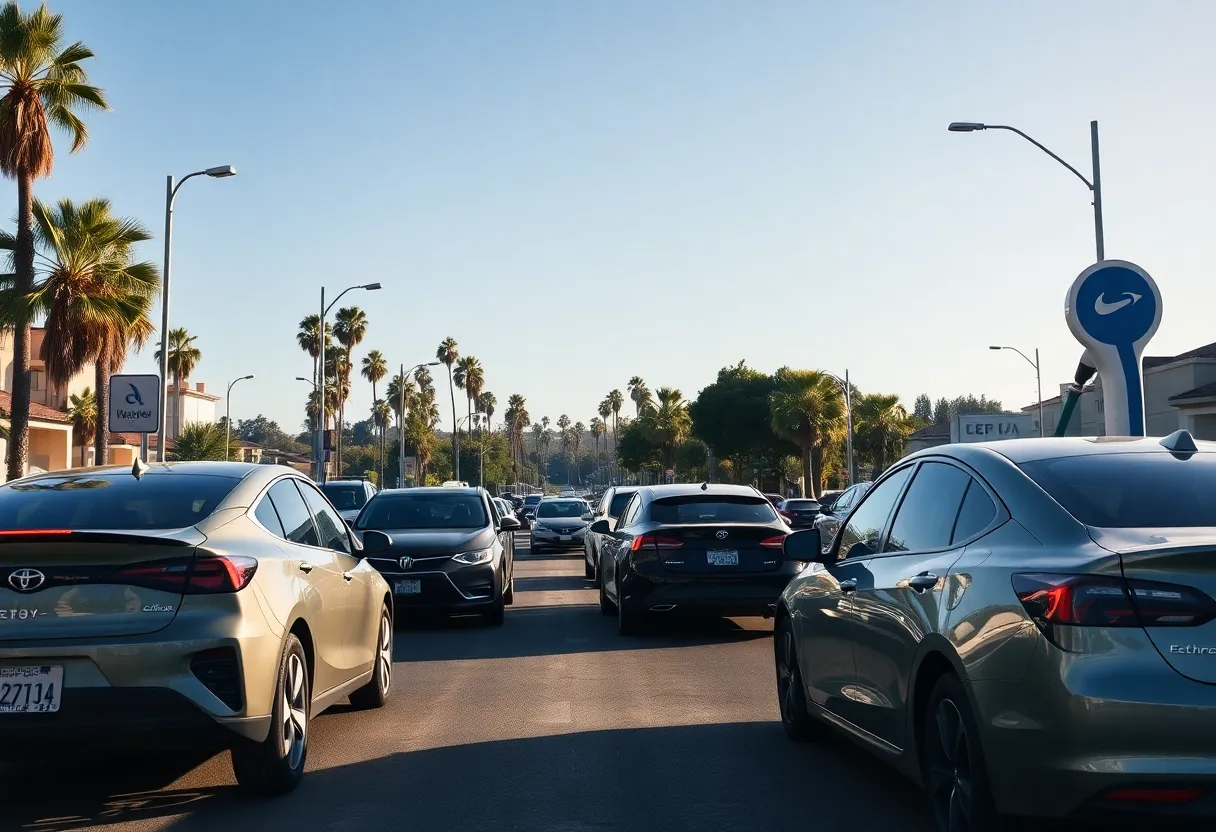News Summary
California is battling a new congressional measure aimed at blocking its ban on gas-powered vehicles by 2035. The U.S. Senate’s approval of this bill poses a significant threat to the state’s climate goals. Governor Newsom plans to launch a legal challenge against this legislation, arguing it prioritizes polluter interests over public health. The Senate’s actions also raise concerns about states’ rights and the federal government’s role in environmental regulation. The outcome could impact automotive standards nationwide, as other states look to California for guidance.
California has moved to block a new congressional measure that aims to halt the state’s groundbreaking ban on gas-powered vehicles effective by 2035. The U.S. Senate recently voted in favor of a bill that would prevent California from implementing its regulations, which are seen as pivotal in the nation’s shift toward electric vehicles (EVs). President Donald Trump is anticipated to sign this legislation into law.
In addition to blocking the gas-powered vehicle ban, the Senate’s vote also encompassed actions against California’s regulations intended to limit tailpipe emissions and nitrogen oxide pollution from trucks. This comes as a major setback for California’s ambitious climate goals.
Following the Senate’s decision, Governor Gavin Newsom announced intentions to file a legal challenge against Congress. He characterized the legislative actions as illegal, arguing that they serve the interests of polluters rather than addressing environmental concerns. Newsom emphasized that the fight relates fundamentally to air quality and health issues rather than the promotion of electric vehicles.
California Attorney General Rob Bonta has prepared to contest the Republican-led measures on legal grounds, signaling a significant legal battle ahead. The Senate Republicans utilized a special provision to move the legislation through the Senate, bypassing the usual filibuster rules.
California represents approximately 11% of the U.S. automobile market, which means its decisions have nationwide implications on purchasing trends and vehicle standards. Environmentalists have expressed strong disapproval of the Senate’s actions, considering them detrimental to public health and air quality. In contrast, Republicans argue that California’s rules create unnecessary burdens for consumers and auto manufacturers, as well as strain on the nation’s energy infrastructure.
The Senate’s vote raised concerns about the erosion of states’ rights, particularly regarding legislative autonomy. The move against California’s initiative is reflective of broader tensions between state and federal authority over environmental regulations. The GOP’s stance is that the transition to electric vehicles should be prompted by market forces rather than mandated by government regulation.
In 2020, Governor Newsom had put forth plans to phase out all new gas-powered vehicle sales by 2035, including provisions requiring auto manufacturers to progressively enhance their sales of zero-emission vehicles. However, the recent legislative changes would significantly disrupt these plans. Moreover, two additional measures aimed at curtailing emissions from trucks and smog limits were also part of the congressional package.
This legislative action is particularly notable as the Biden administration had previously restored California’s authority to establish its own stringent emissions standards, and the recent measures appear to roll back those allowances. The implications extend beyond California; several other states that typically follow California’s lead in emissions policy are now reconsidering their commitments to strict regulations in light of recent congressional developments.
Critics of the congressional actions argue that dismantling California’s emissions standards undermines crucial efforts to combat climate change and improve air quality. Furthermore, only a single Democratic senator supported the measure to block California’s vehicle ban, citing economic concerns for constituents within the auto industry. Automakers now face uncertainty regarding future compliance, especially as some have previously aligned with California’s stringent standards.
As the landscape of automotive regulation evolves, the ongoing conflict captures the essence of the struggle between environmental policies and economic interests, while raising questions about the future direction of U.S. automotive standards and the viability of state-led environmental initiatives.
Deeper Dive: News & Info About This Topic
- JOC: California Rips US Senate Move Targeting States’ Emissions Rules
- Wikipedia: California Emissions Regulations
- Autoweek: Congress Rescinds California Emissions Standards
- Encyclopedia Britannica: Emission
- Jalopnik: California Emissions Standards Challenged
- Google Search: California Emissions Standards
- AP News: Senate California Electric Cars Emissions
- Google Scholar: California Emissions Regulations
- The Guardian: Republicans California EPA Waiver Cars
- Google News: California Vehicle Ban

Author: STAFF HERE HUNTINGTON BEACH
The Huntington Beach Staff Writer represents the experienced team at HEREHuntingtonBeach.com, your go-to source for actionable local news and information in Huntington Beach, Orange County, and beyond. Specializing in "news you can use," we cover essential topics like product reviews for personal and business needs, local business directories, politics, real estate trends, neighborhood insights, and state news affecting the area—with deep expertise drawn from years of dedicated reporting and strong community input, including local press releases and business updates. We deliver top reporting on high-value events such as the Huntington Beach Surf City USA Marathon, the U.S. Open of Surfing, Fourth of July celebrations at the Huntington Beach Pier, and community festivals at Huntington Beach Central Park. Our coverage extends to key organizations like the Huntington Beach Chamber of Commerce and Visit Huntington Beach, plus leading businesses in retail, hospitality, and outdoor recreation that drive the local economy. As part of the broader HERE network, including HEREAnaheim.com, HERECostaMesa.com, HERESantaAna.com, and HERELosAngeles.com, we provide comprehensive, credible insights into Southern California's dynamic landscape.





